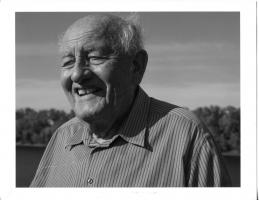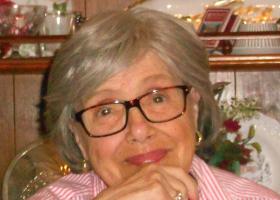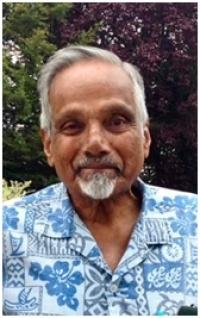 Dr. Julius Gy. Fabos of Amherst, April 15, 1932 – February 18, 2022
Dr. Julius Gy. Fabos of Amherst, April 15, 1932 – February 18, 2022

If you were ever invited to Dr. Julius Gy. Fabos’ house in Amherst, you may have been quizzed on the top five wine regions of the world, lectured on the benefits of yogurt on granola, or queried about your five-year plan. A planner himself, and an emeritus professor of landscape planning at the University of Massachusetts in Amherst, Julius was a generous man who welcomed countless guests to his Amherst home over the years, pouring out wine with a free hand and beckoning all to taste the gulyás (mild, hot, and hotter) cooked in special kettles over coals on his “gulyás terrace.”
Gyula “Julius” Fábos was born in 1932 in Marcali, Hungary to Istvan Fábos and Gizella (Vajda) Fábos. He died on February 18 at Cooley Dickinson Hospital at age 89, leaving his wife Edith (Häusermann) Fabos, children Anita Fábos (Karim Sumun), Adrian Fabos (Colleen Jennings) and Bettina Fabos (Chris Martin), and four granddaughters, Olivia Fabos Martin, Sabine Fabos Martin, Maya Jabrallah, and Arianna Roeder Fabos (he liked to say that he “specialized in granddaughters.”) Julius also leaves his sister and best friend, Aranka (Ari) Hévizi, nephew László Hévizi (Nóra Gál) and their children Dorottya, Márton, and Lilla Réa.
Julius came to the United States as a 25-year-old-refugee after fleeing the uncertain conditions brought on by the 1956 Hungarian Revolution. He arrived in New York on New Year’s Day in 1957, married Edith Häusermann in New Brunswick, New Jersey in 1959 while studying horticulture at Rutgers University, and began rebuilding his life. He and Edith moved to Cambridge, MA so he could attend graduate school in landscape architecture at Harvard (he earned a doctorate from the University of Michigan in 1973). Julius took up a job offer at UMass Amherst in 1964 even as his Harvard professors dismissed Amherst as a “cow town,” and remained on the Landscape Architecture and Regional Planning faculty there until his retirement in 1997. He was a prolific researcher and author of many books, articles and research bulletins. His numerous academic accomplishments included a 1968 book re-introducing Frederick Law Olmstead as America’s first landscape architect, advocating computer-aided design, GIS technology and “paperless” landscape architecture and regional planning, and promoting the development of greenways. He received top awards and honors in his field, as well as an honorary degree from the Hungarian University of Horticulture.
But perhaps what most people remember about Julius was the way he supported his students and guided them in their career development. Beyond mentoring graduate students at UMass, he had visiting appointments in Australia, Portugal, and Hungary where he nurtured new faculty and their blossoming landscape architecture graduate programs. He continued to stay in touch with his students around the world from decades of teaching, and had a way of bringing people together through conferences, trips, and parties. Julius embodied a mixture of politically incorrect and meaningful support for women, office staff, and new colleagues. He never went on a trip without bringing gifts home to the secretaries who converted his chicken-scratch handwriting into academic documents. Though he championed the use of computers in his field from the start, Julius never learned how to type, turn on a computer, or use a smartphone. He was, however, an early adopter (and larger-than-life enthusiast) of Nikon cameras, Hawaiian shirts, and jogging. In fact, Julius was one of the first joggers in Amherst, covering two miles around his Amherst neighborhood every morning wearing Bermuda shorts, dress socks, and low-rise Converse sneakers. He later discovered (and fervently embraced) New Balance running shoes—size 13.
As he pursued his version of the American dream, Julius never lost his emotional connection to Hungary. His unmistakable Hungarian-accented English was a quirky and lovable part of his personality and a mainstay of his jokes (when asked where he was born, he’d inevitably reply, “New JOY-sey”). He convinced Edith to paint their house the color of Hungarian paprika (with green shutters). He self-published a nostalgic memoir about his life entitled Son of a Kulak: How a Hungarian Farm Boy Survived World War II and Escaped Stalinist Oppression for a New Life in America. And despite a rewarding academic career, Julius cultivated the goal of regaining the number of acres of land lost by his family to communists. “Land” meant “home,” and Julius was an ardent investor in rental and forest properties. He also invested in property and security for his family back in Hungary, planning, as always, to avoid uncertainty at any cost.
His exuberant life was further enriched by his wife of 62 years, Edith. Julius was a fixture at Edith’s many musical performances. He also had enduring relationships with his children and grandchildren, who came to call him Gyuszi, a diminutive of his given Hungarian name, Gyula. And he loved his cats, Chippy, Spike, Kibbles, and Bits (and they loved his generous lap!). A man of many favorite sayings, Julius liked to end every conversation in his last years with the exhortation, “Enjoy, enjoy, enjoy!”
He will be buried in a private ceremony at the Olmstead-inspired Wildwood Cemetery in a plot he chose for its eastward view– towards Hungary. A celebration of his life will be held at a future date.
In lieu of flowers, the family appreciates donations to the Fisher Home, the Pioneer Valley Symphony, or a charity of your choice. Memorial guestbook at www.douglassfuneral.com


